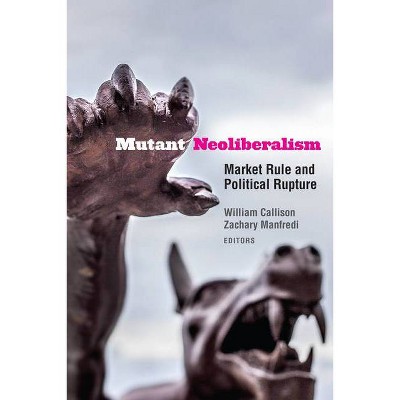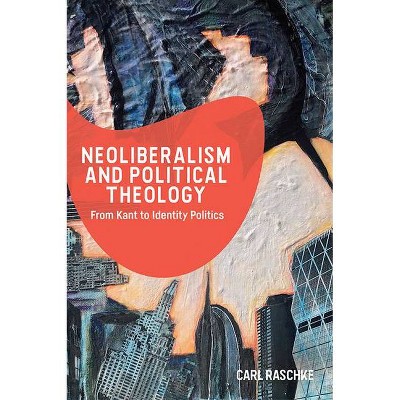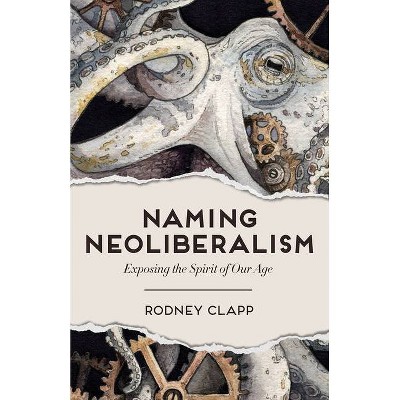Mutant Neoliberalism - by William Callison & Zachary Manfredi (Paperback)

Similar Products
Products of same category from the store
AllProduct info
<p/><br></br><p><b> About the Book </b></p></br></br>This interdisciplinary collection, featuring some of today's most prominent political theorists, sociologists, philosophers, and historians, challenges narratives of neoliberalism's demise. The book queries whether contemporary political ruptures--including the rise of far-right forces--will challenge, support, or extend the reach of market rule around the globe.<p/><br></br><p><b> Book Synopsis </b></p></br></br><p>Tales of neoliberalism's death are serially overstated. Following the financial crisis of 2008, neoliberalism was proclaimed a "zombie," a disgraced ideology that staggered on like an undead monster. After the political ruptures of 2016, commentators were quick to announce "the end" of neoliberalism yet again, pointing to both the global rise of far-right forces and the reinvigoration of democratic socialist politics. But do new political forces sound neoliberalism's death knell or will they instead catalyze new mutations in its dynamic development? <p/><i>Mutant Neoliberalism</i> brings together leading scholars of neoliberalism--political theorists, historians, philosophers, anthropologists and sociologists--to rethink transformations in market rule and their relation to ongoing political ruptures. The chapters show how years of neoliberal governance, policy, and depoliticization created the conditions for thriving reactionary forces, while also reflecting on whether recent trends will challenge, reconfigure, or extend neoliberalism's reach. The contributors reconsider neoliberalism's relationship with its assumed adversaries and map mutations in financialized capitalism and governance across time and space--from Europe and the United States to China and India. Taken together, the volume recasts the stakes of contemporary debate and reorients critique and resistance within a rapidly changing landscape. <p/><b>Contributors</b>: Étienne Balibar, Sören Brandes, Wendy Brown, Melinda Cooper, Julia Elyachar, Michel Feher, Megan Moodie, Christopher Newfield, Dieter Plehwe, Lisa Rofel, Leslie Salzinger, Quinn Slobodian</p><p/><br></br><p><b> From the Back Cover </b></p></br></br><p>"Neoliberalism has frequently been pronounced dead in the wake of the 2008 financial crisis, but the beast lives on. This collection is a strong addition to recent studies of the topic, exploring neoliberalism's relationships with the EU, the far right, populism, and gender."--Doug Henwood, Producer of <i>Behind the News</i> <p/>"This is the book we need today: the authors refuse to debate about what liberalism 'is' and instead take us into the thicket of its fracturing and multiple futures in the wake of the great financial crisis."--Elizabeth Povinelli, Columbia University <p/>Tales of neoliberalism's death are serially overstated. Following the financial crisis of 2008, neoliberalism was proclaimed a "zombie," a disgraced ideology that staggered on like an undead monster. After the political ruptures of 2016, commentators were quick to announce "the end" of neoliberalism yet again, pointing to both the global rise of far-right forces and the reinvigoration of democratic socialist politics. But do new political forces sound neoliberalism's death knell or will they instead catalyze new mutations in its dynamic development? <p/><i>Mutant Neoliberalism</i> brings together leading scholars of neoliberalism to rethink transformations in market rule and their relation to ongoing political ruptures. The chapters show how years of neoliberal governance, policy, and depoliticization created the conditions for thriving reactionary forces, while also reflecting on whether recent trends will challenge, reconfigure, or extend neoliberalism's reach. The contributors reconsider neoliberalism's relationship with its assumed adversaries and map mutations in financialized capitalism and governance from Europe and the United States to China and India. Taken together, the volume recasts the stakes of contemporary debate and reorients critique and resistance within a rapidly changing landscape. <p/><b>Contributors</b>: Étienne Balibar, Sören Brandes, Wendy Brown, Melinda Cooper, Julia Elyachar, Michel Feher, Megan Moodie, Christopher Newfield, Dieter Plehwe, Lisa Rofel, Leslie Salzinger, Quinn Slobodian <p/><b>William Callison</b> is Visiting Assistant Professor of Government and Law at Lafayette College. <p/><b>Zachary Manfredi</b> is an Equal Justice Works Fellow at the Asylum Seeker Advocacy Project.</p><p/><br></br><p><b> Review Quotes </b></p></br></br><br>In the debate over what neoliberalism was, whether or not it died, the question of what it morphed into has not been explored. Until now. Callison and Manfredi take up that challenge in this collection of essays by leading scholars... the essays, taken together, provide an extended examination of the possible mutations of neoliberalism that scholars will explore in their future work.-- "Choice"<br><br><i>Mutant Neoliberalism</i> is an excellent collection of essays canvassing what editors William Callison and Zachary Manfredi rightly diagnose as the changing face of neoliberalism-really, the multiplicity of national, transnational and post-national neoliberalisms-evolving in the aftermath of the 2007-2008 financial crisis.<b>---David Singh Grewal, UC Berkeley School of Law, <i></i></b><br><br>Engaging with neoliberalism and its mutations, offers us a way to think about the complexity and struggle of the way forward... Callison and Manfredi's collection refuses to offer guarantees about the end of neoliberalism, or even the end of the beginning. But... this collection offers critical insights about how to strategize and struggle against it.<b>---Corinne Blalock, Executive Director of the Law and Political Economy Project, <i></i></b><br><br>Neoliberalism has frequently been pronounced dead in the wake of the 2008 financial crisis, but the beast lives on. This collection is a strong addition to recent studies of the topic, exploring neoliberalism's relationships with the EU, the far right, populism, and gender.<b>---Doug Henwood, Producer of Behind the News, <i></i></b><br><br>This is the book we need today. The authors refuse to debate about what liberalism 'is' and instead take us into the thicket of its fracturing and multiple futures in the wake of the great financial crisis.<b>---Elizabeth Povinelli, Columbia University, <i></i></b><br><br>Viewed in terms of mutation, neoliberalism can be understood as containing various genes and genres that were innocent enough at their birth, but which adapt and grow in response to history, often in malign ways. It's a valuable framing and a terrific collection of pieces, that has helped me look back on my own work and that of other neoliberalism scholars in a fresh light.<b>---William Davies, Goldsmiths, University of London, <i></i></b><br><p/><br></br><p><b> About the Author </b></p></br></br><b>William Callison (Edited By) </b><br> <b>William Callison</b> is Visiting Assistant Professor of Government and Law at Lafayette College. He is co-editor of "Rethinking Sovereignty and Capitalism" (<i>Qui Parle</i>) and of "Europe at a Crossroads" (<i>Near Futures Online</i>, Zone Books). <p/><b>Zachary Manfredi (Edited By) </b><br> <b>Zachary Manfredi</b> is an Equal Justice Works Fellow at the Asylum Seeker Advocacy Project. His recent work has appeared or is forthcoming in <i>Humanity</i>, <i>The New York University Law Review</i>, <i>The Texas Journal of International Law</i>, and <i>Critical Times</i>. <p/>
Price History
Price Archive shows prices from various stores, lets you see history and find the cheapest. There is no actual sale on the website. For all support, inquiry and suggestion messagescommunication@pricearchive.us



















